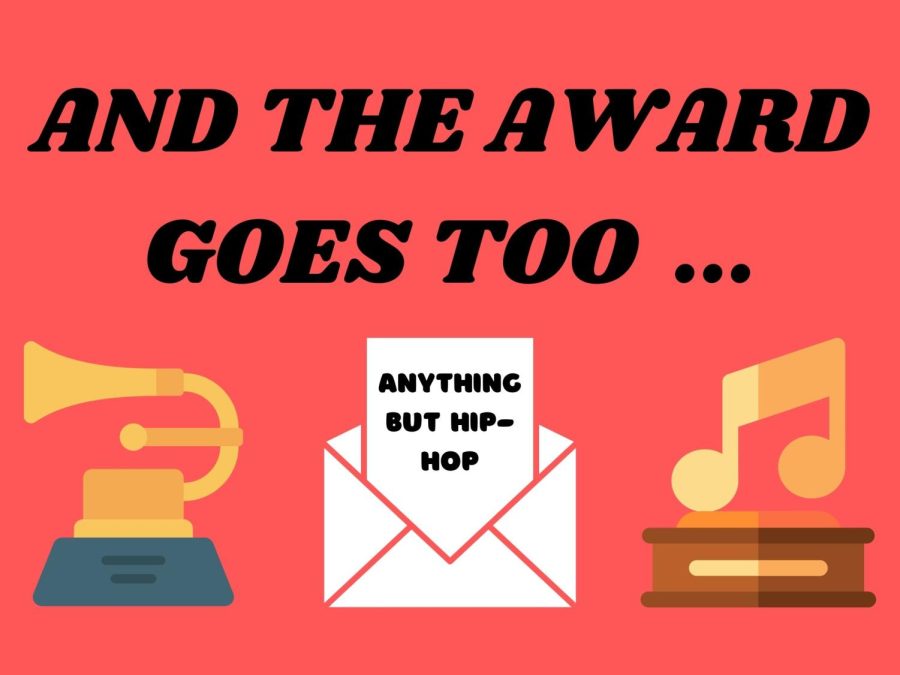On Sunday, April 3, Las Vegas played host to the 64th annual Grammy Awards, which had the usual flair, festivities, and questionable fashion choices that can be expected from music’s biggest night. But like most years, one crucial missing ingredient: a rightful amount of love for hip-hop music.
To anyone who’s watched the Grammys on a yearly basis, it’s likely no surprise the genre of hip-hop continues to be disrespected, but each year it becomes more perplexing. Despite being the most-listened-to genre of music in the U.S., hip-hop artists and hip-hop categories are usually slighted in favor of other genres, and it sometimes happens in very subtle ways.
One instance is when it comes to live performances at the Grammys. Out of 17 performances at this year’s show, there was a single solo performance from a rap artist: Queensbridge rapper Nas’s medley of his early 2000s hits along with one of his more recent songs “Rare.” The only other rapper who performed on the night was Jack Harlow, who performed his feature on Lil Nas X’s smash hit “Industry Baby.”
As seen by Meg Thee Stallion and Cardi B’s mashup of “Up” and “WAP” at last year’s Grammy Awards and both of Kenrick Lamar’s legendary Grammy performances over the past several years, any time a rapper graces the Grammys stage there is potential for a historic performance – but only if they’re given the opportunity in the first place.
Another example is the categories that are chosen to be a part of the Grammys telecast. The Grammys can play favorites by deciding which award presentations are shown on television, and one big omission from Sunday’s show was the best rap album award.
For his vividly adventurous jet-setting album “Call Me If You Get Lost,” Tyler, the Creator took home his second best rap album Grammy of the past three years. Since he is currently on tour, Tyler did not attend the ceremony and instead recorded his acceptance speech through Instagram Live. This victory was huge, as it also marked a Grammy victory for the legendary DJ Drama, who narrated the album.
Even though Tyler and DJ Drama were not in attendance, having their victory announced on TV would have given the success of the album as well as the significance of their win the proper spotlight it deserved. (It also deserved an album of the year nomination but that’s a whole other discussion.)
However, the most controversial moments of the night came from the “In Memoriam” segment.
L.A. rapper Drakeo the Ruler, who was fatally stabbed last December at the Once Upon in L.A. Festival, was not included in the segment, which sparked a lot of vocal opinions from rap fans and writers alike who criticized his omission. This included a tweet from music journalist Jeff Weiss, who extensively documented Drakeo’s career, as well as the lengthy time he spent incarcerated while awaiting trial for gang enhancement crimes.
Drakeo didn't make the Grammys memoriam tribute, another reminder why they're worthless
— Otto Von Biz Markie (@Passionweiss) April 4, 2022
An even greater controversy from the segment was former Louis Vuitton artistic director and Off-White CEO Virgil Abloh being credited as a “hip-hop fashion designer.” Though labeling Virgil Abloh as someone with a direct correlation to hip-hop is not necessarily wrong, there is a valid argument that it diminishes the impact he had on the entire world of fashion.
Summing up a person’s lifelong artistic contribution in five words or less can be challenging, but this characterization fits with the way shows like the Grammys often lump Black artists into “urban” categories as an “other” that exists outside of mainstream music recognition.
All that being said, it seems viewers have slowly begun to realize how the Grammys is an inaccurate portrayal of the best that music has to offer. It can be simultaneously acknowledged when deserving people win at the Grammys while still recognizing the show’s shortcomings and dwindling relevancy. Because even a broken clock is right twice a day.
Though it’s good that the amount of cultural relevance placed in the Grammys has diminished, it would still be worthwhile for hip-hop to be given its rightful due. After all, if the biggest music awards show in the country can’t celebrate the biggest genre in music then what’s the point?












